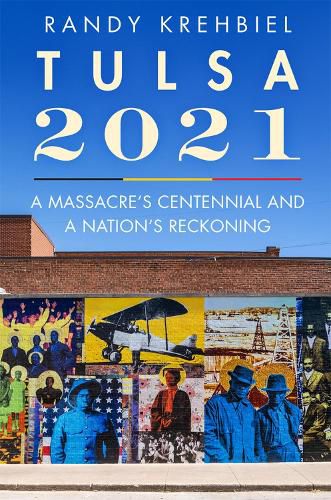Readings Newsletter
Become a Readings Member to make your shopping experience even easier.
Sign in or sign up for free!
You’re not far away from qualifying for FREE standard shipping within Australia
You’ve qualified for FREE standard shipping within Australia
The cart is loading…






2021: As the centennial of one of the nation's worst race massacres approached, citizens of Tulsa faced the prospect with hope and dread. Hope that the anniversary would show Tulsa had changed since that day in 1921, when a white mob left the city's thriving African American Greenwood neighborhood a smoldering ruin. Dread that Tulsa's faults would be exposed as never before, its racism reinforced rather than mitigated. The anniversary-in the wake of COVID-19, a combustible presidential visit, and a nationwide explosion of racial tension-was even more fraught than expected. An extraordinary account of a city under inordinate pressure, Tulsa, 2021 offers a deeply informed, behind-the-scenes view of how Tulsans and Americans met that moment of crisis, and what the experience can tell us about racial politics today.
Following up on his book Tulsa, 1921, Randy Krehbiel brings a seasoned reporter's keen eye and an insider's understanding to the story of a city contending with racial and urban stresses that are both unique to Oklahoma and indicative of larger trends. The conflicts he uncovers were not split entirely along racial lines, but often revolved around the power of political messaging to shape public opinion. His detailed picture of Tulsa in 2021 reveals how politics, unacknowledged racism, and fear destroyed or damaged promising relationships between white Republican leaders and Black, mostly Democratic Tulsans.
In 1921, factions of whites and Blacks fought to control the narrative of the Tulsa Race Massacre. As Tulsa, 2021 dramatically demonstrates, the struggle continues to this day.
$9.00 standard shipping within Australia
FREE standard shipping within Australia for orders over $100.00
Express & International shipping calculated at checkout
2021: As the centennial of one of the nation's worst race massacres approached, citizens of Tulsa faced the prospect with hope and dread. Hope that the anniversary would show Tulsa had changed since that day in 1921, when a white mob left the city's thriving African American Greenwood neighborhood a smoldering ruin. Dread that Tulsa's faults would be exposed as never before, its racism reinforced rather than mitigated. The anniversary-in the wake of COVID-19, a combustible presidential visit, and a nationwide explosion of racial tension-was even more fraught than expected. An extraordinary account of a city under inordinate pressure, Tulsa, 2021 offers a deeply informed, behind-the-scenes view of how Tulsans and Americans met that moment of crisis, and what the experience can tell us about racial politics today.
Following up on his book Tulsa, 1921, Randy Krehbiel brings a seasoned reporter's keen eye and an insider's understanding to the story of a city contending with racial and urban stresses that are both unique to Oklahoma and indicative of larger trends. The conflicts he uncovers were not split entirely along racial lines, but often revolved around the power of political messaging to shape public opinion. His detailed picture of Tulsa in 2021 reveals how politics, unacknowledged racism, and fear destroyed or damaged promising relationships between white Republican leaders and Black, mostly Democratic Tulsans.
In 1921, factions of whites and Blacks fought to control the narrative of the Tulsa Race Massacre. As Tulsa, 2021 dramatically demonstrates, the struggle continues to this day.